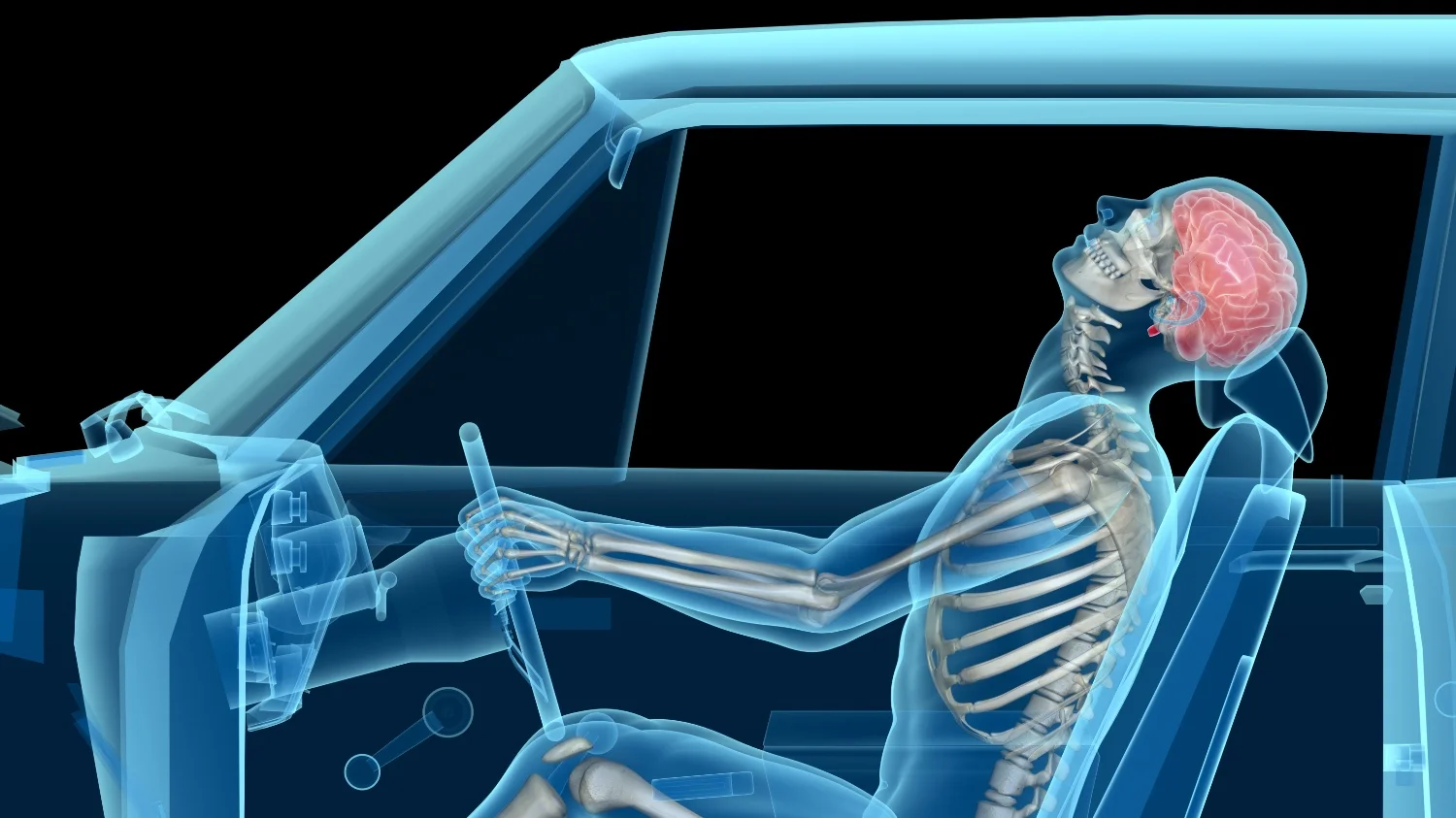Can you get a brain injury in an auto accident if you don’t hit your head?
Because the Centers for Disease Control and Prevention (CDC) specifically defines a traumatic brain injury (TBI) as being caused by a bump, blow, or jolt to the head, or a penetrating injury to the head, it is understandable that most people believe TBIs require people to strike their heads somehow. Nothing can be further from the truth. Many people can violently have their heads shaken during more forceful collisions, and a Murray personal injury lawyer will know how to prove that the gravitational force equivalent (g-force or Gs) involved in a motor vehicle accident caused a brain to be rapidly thrown within a person’s skull.
The CDC defines a concussion as a type of TBI that may be caused by, again, a bump, blow, or jolt to the head or hit to the body, causing a person’s head and brain to move rapidly back and forth. Concussions are, in turn, often classified as mild TBIs. People who suffer TBIs need to know they can still be entitled to compensation regardless of whether their injury is classified as mild, moderate, or severe.
Related CDC literature notes that concussions are brain injuries and all concussions are serious. Most concussions will not involve any loss of consciousness.
The myth of physical contact & Brain injuries
Many TBI claims stemming from car accidents will require in-depth investigations into crashes. which Insurance adjusters will look at the resulting damage and draw conclusions based on that damage. Extensive damage resulting from any one of several different kinds of crashes can help prove a person suffered a TBI because the force of a collision can be enough to cause a TBI even when a victim does not hit their head.
Sudden violent movements can place the pressure of many Gs on a person, and TBIs can be a common result. Some of the types of accidents that lead to TBIs may include:
- rear-end collisions
- head-on collisions
- rollover accidents
- high-speed collisions
- hit-and-run accidents
- T-bone or broadside collisions
- distracted driving accidents
- Driving Under the Influence (DUI) of drugs or alcohol crashes
- intersection accidents
- multiple-vehicle accidents
The Mayo Clinic also refers to a concussion as being a TBI and further states that persistent post-concussive symptoms or post-concussion syndrome happen when symptoms of concussions last beyond an expected recovery period of weeks to months. Such symptoms can include headaches, dizziness, and problems with concentration or memory.
Post-concussion syndrome symptoms may be more common in people who unknowingly sustained concussions in car accidents but did not seek medical treatment. It is important for all people to know that they will best protect their rights to financial compensation for their injuries by seeking medical attention immediately after their accidents.
Johns Hopkins Medicine states that some people may suffer diffuse axonal injuries (DAIs). In cases in which there is shearing or tearing of a brain’s long connecting nerve fibers (axons) when it suffers an injury and shifts and rotates inside a bony skull. Such changes in the brain can often be microscopic and may not be evident on computed tomography (CT scan) or magnetic resonance imaging (MRI) scans.
Be aware of possible TBI symptoms
TBIs can cause a wide variety of possible symptoms, and the severity of a TBI will impact the extent of the symptoms. According to the United States Department of Health and Human Services, symptoms of mild TBIs can include the following:
- fatigue or drowsiness
- state of being dazed, confused, or disoriented
- loss of consciousness for a few seconds to minutes
- lightheadedness
- blurred vision
- headaches
- confusion
- dizziness or loss of balance
- changes in sleep habits
- difficulty sleeping
- tiredness or sleepiness
- memory or concentration problems
- behavior or mood changes
- ringing in the ears, or tinnitus
- bad taste in the mouth
- depression or anxiety
- sensitivity to light or sound
- trouble with memory, concentration, attention, or thinking
- nausea or vomiting
Moderate or severe TBIs can involve the same symptoms as mild TBIs but can also involve other symptoms:
- headaches that get worse or do not go away
- dilation of one or both pupils in the eyes
- vision loss in one or both eyes
- loss of consciousness for a few minutes to hours
- repeated vomiting or continued nausea
- clear fluids draining from the nose or ears
- profound confusion
- slurred speech
- numbness or tingling of arms or legs
- convulsions or seizures
- weakness or numbness in fingers and toes
- inability to wake up from sleep
- uncoordinated or “clumsy” movements
- increased confusion, restlessness, or agitation
- enlargement of the pupil of one or both eyes
- loss of coordination
An estimated 2 million Americans suffer some kind of TBI every year. It is now known as a silent epidemic, with TBI being the leading cause of death and disability for people less than 45 years of age. TBI happens more often than breast cancer, acquired immunodeficiency syndrome (AIDS), multiple sclerosis, and spinal cord injury combined.
A person in the United States will suffer a TBI roughly every 15 seconds. Annual numbers indicate nearly 100,000 people die from TBIs, with 500,000 more being permanently disabled by them. Of approximately 5.3 million Americans, over 2 percent of the population is living with a disability resulting from a TBI.
How insurance companies handle these cases
Utah requires motor vehicle owners to have personal injury protection (PIP) insurance, also known as “no-fault insurance”. This coverage will pay for a person’s medical bills, lost income, and other related expenses when they suffer injuries in an accident with that vehicle. PIP pays regardless of fault, but Utah only requires drivers to have $3,000 in PIP insurance.
People can purchase policies providing up to $100,000 of coverage, and PIP can provide coverage for:
- up to $3,000 in medical expenses per person
- up to $3,000 in death benefits to heirs when somebody dies
- $1,500 in burial costs per deceased person
- 85 percent of lost income or up to $250 per week
- up to $20 per day as a special allowance for services
Whether you are a driver filing a PIP claim with your own insurance company or you are seeking compensation from another party’s insurer, you can bet that your PIP claim will face intense scrutiny. Insurance companies always want to keep their costs low, so chances are very good that you will be receiving a settlement offer that falls well below your expectations.
Lowball settlements are very common with insurers after most car accidents, so try not to draw any sweeping conclusions about the health of your case based on this offer. You should instead seek legal representation so a personal injury lawyer can negotiate a fairer and full settlement on your behalf.
When your costs will exceed the limits of another driver’s PIP policy, or an insurance company is proving unwilling to negotiate in good faith, you may have to file a lawsuit to seek a measure of justice. Victims in most car accident claims are seeking compensation based on the negligence of another driver. You must prove in court that another driver owed you a duty of care, the other driver breached their duty of care by driving negligently, the negligence caused your injuries, and those injuries are causing damages.
When a car crash case goes to court, then a victim can be in line to receive a judge or jury award known as compensatory damages, which are often economic or non-economic in nature.
Economic damages refer to tangible costs a victim must pay, including:
- medical bills
- lost wages
- property damage
- impact on future earning capacity
Non-economic damages will be far more subjective concerns, often involving such examples as:
- pain and suffering
- emotional distress
- loss of enjoyment of life
- disability
All people need to be extremely cautious when they are dealing with an insurance company after an automobile accident because insurers are actively trying to get people to say things that will later harm their case. While you might not see any harm in stating that you did not hit your head in a collision, this admission can be very damaging later on, so you should actively avoid talking to an insurer about anything relating to your case.
Anybody dealing with a concussion, TBI, or another kind of head injury after a car crash in Utah will want to be certain that they retain legal counsel as soon as they feel well enough to discuss their case. It is always important to get a lawyer involved in your case sooner rather than later because there are strict time limits on legal actions, and you will give yourself the best chance of satisfying state law when you have somebody handling all of the necessary legwork on your behalf.
Call us today to speak with an Attorney
If you or your loved one suffer a TBI in a car accident without striking your head in Utah, do not delay in seeking legal help. Our firm has recovered millions of dollars for our clients. You can call us today at (385) 429-9960 or contact us online to receive a free consultation with our Murray personal injury lawyer.




